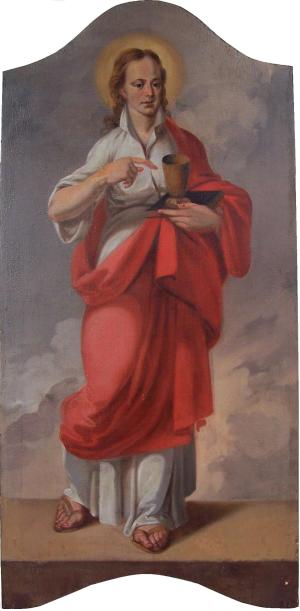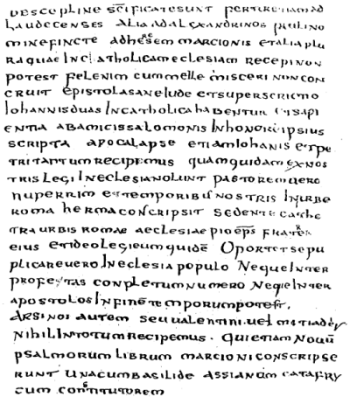is the new testament reliable?
D. Who was John and how do we know if he wrote the Gospel of John?

Like the other three Gospels, John does not name himself as the author of this narrative. However, unlike the three synoptic Gospels (Matthew, Mark, Luke), the writer does identify himself as an eyewitness and as one of the disciples of Christ. He does not state his name, but he does make it clear to his audience that he is the “beloved disciple”. There are some who postulate that John may have died prior to the ending of this Gospel and that an associate finished the final part of the Gospel. Even if this were true, (the evidence does not demand this), the vast majority of the Gospel is claimed to be written by the “beloved disciple”.
Irenaeus: (125-202 A.D.)
“Then John, the disciple of the Lord, who also leaned on His breast (John 13:25; 21:20) himself produced his Gospel while he was living in Ephesus.” – Irenaeus, Against HeresiesIn commenting on John 1:1, Irenaeus states:“For that according to John relates His original, effectual, and glorious generation from the Father, thus declaring, “In the beginning was the Word, and the Word was with God, and the Word was God.” Against Heresies book 3:146
Origen: (185-253 A.D.)
“..And the third by Luke, the Gospel commended by Paul, and composed for Gentile converts. Last of all that by John.” Ecclesiastical History Book 6 Chapter 25Origen writes in his commentary on John 1:1:“…and as in his Gospel John indicates the same thing, saying, “In the beginning was the Word, and the Word was with God, and the Word was God: the same was in the beginning with God: all things were made by Him; and without Him was not anything made;” Origen de Prinipiis, book 2.165
Clement of Alexandria: (150-215)
In discussing the order of the composition of the Gospels, Clement said regarding the Gospel of John;“Last of all, John aware that the external details had been recorded in the Gospels (Matthew, Mark and Luke), was urged by his disciples and divinely moved by the Spirit to compose a spiritual Gospel” – Ecclesiastical History Book 6 Chapter 14.7
Ignatius: (70-117 A.D.)
There is a commentary found in Ignatius’s writings where he attributes the Gospel of John to the disciple John and quotes from the Gospel in his seven epistles. These quotations and references to John by Ignatius solidify the second century belief in the authorship by John.F.F. Bruce, the professor of biblical criticism at the university of Manchester stated –“About A.D. 115, Ignatius, the Bishop of Antioch refers to ‘The Gospel’ as an authoritative writing and as he knew more than one of the four Gospels it may well be that by ‘The Gospel ‘sans phrase’ he means the fourfold collection which went by that name.”
Bruce, F.F. -The New Testament Documents: Are They Reliable?, Downers Grove: Inter Varsity Press, 1982 – page 23.Craig Blomberg, a New Testament scholar and historian who has studied extensively on the subject matter and historical references in the Gospel of John, has written regarding its authorship. He indicates that liberal scholars doubt the authenticity of John’s authorship of the Gospel. In response to this assertion, he states:“Indeed a strong case for the apostle John’s having written a substantial portion of the Fourth Gospel – perhaps even all but the closing verses – can still be credibly defended. But the question of John’s historical reliability depends little on the viability of such a case. Recent Johnannine scholarship, sometimes called ‘the new look on John’, has gone a long way to undermine earlier skepticism simply by pointing out evidence for the bulk of the Gospel relying on sources with highly accurate details about Palestinian geography, topography, politics, society and religious custom. The Dead Sea Scrolls have provided parallels to theological concepts once associated exclusively with Greek thought.” – The Historical Reliability of the Gospels , page 206.
 |
Summary
The evidence for the authorship of the four Gospels (Matthew, Mark, Luke and John) by either apostles of Jesus (Matthew and John) or associates of the apostles (Mark and Luke) is indeed very strong.The Muratorian Fragment (A.D. 170), the earliest known list of the books of the New Testament includes only the four Gospels (and Acts as the companion book to the Gospel of Luke) as the accepted, reliable Gospel accounts of the New Testament.The Diatessaron (A.D.160-175) was an early harmony of the Gospels written by the Christian apologist and writer Tatian. The only sources for this harmony were the Gospels of Matthew, Mark, Luke and John.If someone wants to claim that someone else other than Matthew, Mark, Luke or John wrote these Gospels, then they need to provide the external evidence for this claim.
Papias, Polycarp, Ignatius, Irenaeus and other second century sources provide us with the evidence that these writers (Matthew, Mark, Luke and John) were the composers of the Gospel records. Theories based on internal evidence to account for certain statements and passages must not neglect the external evidence of the second century church fathers. My position is that the early church fathers were in a much better position to provide information on the sources for the authorship of the Gospels than theories proposed by scholars regardless of their skills and training. The Church Fathers lived close to the time of these writings, some of them (Papais, Polycarp, Ignatius, Clement of Rome) knew the apostles and had access to the information regarding the dating and authorship of these documents.The place of oral tradition in the Jewish community and by extension in the early Jewish and Gentile church, placed importance on the accurate transmission of Gospel information.
Swedish scholar, Birger Gerrhardsson has done research on the oral teaching methods employed by the disciples of Jesus and in the collective memory of the early church. He affirms in his book Memory and Manuscript, 1964 that the methods of oral teaching that the disciples employed would have provided an accurate method of preserving the teachings of Jesus and the events of the Gospel accounts. This same desire for accuracy regarding the authorship of the Gospels could be included in this assessment.There is no question that human memory does fade and there is a natural tendency to enrich a story as time goes on. The desire to record the events of the Gospel and the teachings of Jesus was important to the early church as indicated by Eusebius and others. There is information provided by Eusebius that requests were made by those within the church that the apostles and early eyewitnesses would provide a written record of the Gospel.
Both Peter (the Gospel of Mark) and John (the Gospel of John) were candidates for this and the result, according to the church history, is that they compiled the Gospels that bare their names. See Ecclesiastical History Book 6 Chapter 14.The internal evidence of the Gospels and the external evidence provided by the early second century church fathers gives a solid indication that the Gospel narratives were written by eyewitnesses of the life of Christ. (See Luke 1:1-4; John 19:35; 21:24; I John 1:1-4; II Peter 1:16-18.)